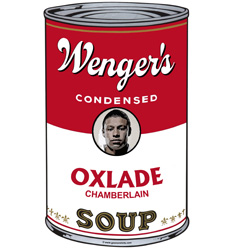“His strength is his strength” was a so-called Colemanball from another era. If you’ve only ever turned on, and tuned in, a television using remote control, you probably haven’t heard of David Coleman or his infamous quotations. So “Google” Colemanball, or whatever you young things use these days to understand what us dinosaurs are banging on about.
Oxen are renowned for their strength, hence the famous idiom. Alex Oxlade-Chamberlain’s physical strength is, indeed, a great asset, but by no means his only one. So if Arsenal’s (full) debutant goalscorer and England U21 international acquires the sobriquet The Ox, do not be surprised and remember where you heard it first. As the die-hards, Shrewsbury Town’s 5,000-strong travelling army, and early purchasers of Carling Cup tickets – I’m assuming the Arsenal Box Office was not inundated by would-be buyers of seats going cheap after the second-half debacle at Ewood Park - witnessed several times at a three-quarters full E******s Stadium, The Ox also possesses a venomous shot; or, put somewhat more agriculturally, he sure can hoof it (geddit?). It is, therefore, an obvious segue to a new chant, set to the tune of Cwm Rhondda, which is better but erroneously known outside Wales as Bread of Heaven (that must really p*ss them off – shame): “Feed the Ox and he will score”.
The ability to run fast is without doubt another of The Ox’s strengths. Those of you less charitable than me may have already concluded that an earlier alumni of the Southampton Football Academy is a one-trick pony, also blessed with tremendous pace but little else. Be that as it may, Alex looks the complete package, although I say so cognisant that I’ve never worked even half a day in football. Watching him recently against Azerbaijan U21s at Vicarage Road, I saw dribbles and quick turns aplenty to both right and left. Days later, a half-time substitute as England trailed Israel 1-0 in a friendly, he made three and also “won” our penalty as we ran out 4-1 winners. Tuesday evening, as he grew in confidence, Shrewsbury’s defenders were forced to back off. As the Bard, who wrote The Taming of the Shrew and several other plays besides, may have said, to usher him inside or to usher him outside, that is the question, or, rather, one of the questions. Another is: why did such an immense talent choose Arsenal over all his other suitors? Could it be that he wanted to continue his unfinished football education under Arsene Wenger? Just a thought.
Given the above, it may seem perverse to end with this request: please do not expect too much of him too soon. The ever-impatient British media will, of course, but, as in all things, we risk heeding them at our peril.







